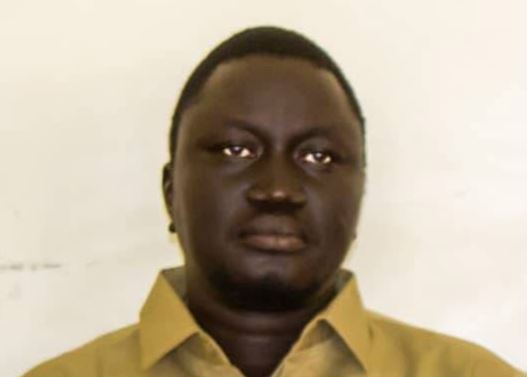
By Deng Ghai Deng
Emmanuel Monychol Akop, the editor-in-chief of Juba-based The Dawn Daily English Newspaper, has been released from the notorious “Blue House,” a detention facility operated by South Sudan’s National Security Service (NSS), after enduring nearly six months of arbitrary detention. His release, confirmed on Thursday, brings an end to a period of uncertainty that had drawn major concern from press freedom advocates.
Akop was released alongside Lang Deng Maluil, CEO of Skylight Agricultural Co. Ltd. Both men were arrested last year for undisclosed reasons, and their detention had been shrouded in secrecy.
A colleague of Monychol, who requested anonymity due to the sensitivity of the matter, confirmed the editor’s release. “Monychol came to the office today (Thursday) confirming that he has been released and proceeded home. So editor Monychol is out of the NSS detention facility,” the colleague stated.
Patrick Oyet, President of the Union of Journalists of South Sudan (UJOSS), welcomed Akop’s release, expressing relief while also voicing concerns about the circumstances of his detention.
“It’s a good thing that he is out. The most important thing that we wanted is for him to be released, he is now released even though we are concerned that since he stayed in cell for a long time it would be good to know the offenses he was accused of,” Oyet said. “We are happy about his release. And we can now say that there is no journalist who is in jail or detention which is a good thing.”
However, NSS spokesperson John David Kumuri stated on Thursday that he had no immediate information regarding Monychol’s release, indicating he would “crosscheck with the officers in charge.”
Akop’s ordeal began on November 28 last year, when individuals believed to be NSS officers visited The Dawn Daily Newspaper office in Juba. They met with Akop before taking him into custody without presenting an arrest warrant. South Sudanese law stipulates that any arrested individual must be brought before a competent court within 24 hours. Yet, from the time of his arrest until his release, Monychol Akop was not heard from, raising serious questions about due process.
His arbitrary detention ignited widespread concerns regarding the unchecked powers of security operatives, particularly in light of the National Security Service Act 2014, which was amended in 2024 to permit arrests without a warrant. This legislation has faced strong criticism from both local and international human rights organizations and press freedom advocates, who warn of its potential to undermine civil liberties and freedom of the press in South Sudan.
The incident underscores a troubling trend of harassment and intimidation faced by media practitioners in the young nation, highlighting the ongoing challenges to a free and independent press.

